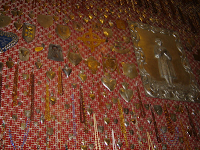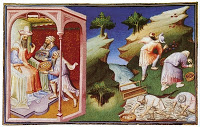Medieval History
It's amazing what happens when intellectually generous people get together. I always held that medieval mattered - thus, well, my entire life, but here, there's a pertinent place for that insistent sometimes even urgent belief. In talking about objects and ethics (animal, vegetable, mineral), we are talking about power, meaning, boundaries which are not so fancy academic ways of saying politics (personal and communal), language (words we use), and difference (us vs. them, us and them, etc.). In other words, I can revel in these ideas and translate them back to students (who in turn will be more critical and aware of the world and make it better place - because that's how it works, right? We can address that another time). Actually, words have been a fascinating element in the conference. The two main critical words yesterday were not from French philosophy (useful as it is), nor were they neo-logism - they were really old English words: "thing" (which in the before time meant a gathering - no, really), and "hoard" (which instantly bring Beowulf to mind - and this project). I can't quite express why that's so wonderful to me that this ancient language would reach forward, that we would reach back into it, to work hard to make sense of objects: what and how they are, and their agency.
One thing is certain: the "Medieval Environmentalism" course is a go (yes, I'll have to think of a better title). Images such as this one from the Marco Polo section of the Livre des Merveilles (1410, BN ms. fr. 2810 - made for Jean, Duc de Berry, and handed down (yes!) to François Ier) showing men digging for emeralds and sapphires for the Khan in a split and writhing nature - now have a discussion. Of minerals, desire, and future markets in the West. One of the key things (and I'm going to go soon because it's time!) is agency: who has it, how it's exercised. We think it's us, we've shaped our very philosophies and politics so that we either have it (justice) or don't (injustice). How's that working out for us? Not all bad, but claiming human agency as primary hasn't solved how we are in the world, or those gross injustices and tragedies we seek to understand. What if we considered (seriously) the agency of objects, their pull on us? What if we considered those elements we have relegated to Nature (animal, vegetable, mineral) as having agency? as framing and shaping more of our experiences than our post-Cartesian world would ever want to know was possible? As Jan Bennett's great talk on hoards was ending last night, I thought of unintentional hoards, hoards revealed by natural disasters. I thought of the tragic, terrifying pictures of Japan and how the tsunami has made thousands of cars, buildings, stuff and things flotsam and jetsam in its rage. Nature has agency - it's just not moral (not at all), and so we dismiss the idea. One last clarification: it's not a return to an innocent age when objects spoke and nature exercised a will - as ever, medieval doesn't have all the answers, it's the questions they ask that I think could help us shape our own.
There have been great pleasures (and only one day of the conference thus far!). Walking out into a sunny urban space, making my way to the Steve-recommended Founding Farmers (oh my Lord, that was good - and I sat next to two people working for anti-poverty organizations who were here to do the work of politics with their congressperson - and who had majored in classics). And thinking of Michael Camille, who would have so loved this crowd, and would have had us laughing and rethinking as he brought forth image after image from his hoard, which he always shared so generously. I miss him.
For now - off to play with Baby Henry and then off to think with others!
- Thing-power In The Classroom: Stones, Ladders, Spit, Onions, Phalluses And Roses
We've had a new student join our Ecology of Medieval Art class, and it was to him that I turned first in asking for a description of the image on the screen (the same one that you see here). "An arrangement of minerals, stones, and quartz,"...
- Weather
Temperate Zones of the World, 15th c.A friend of mine from San Francisco in graduate school used to rejoice and ask to get to our rooftop patio whenever he'd be over and there was, as he would call it, "weather." The rooftop patio was not as...
- Wonder
Diamond power. Livre des Merveilles. BN ms. fr. 2810, f. 182I've been thinking about the multiplicity and double-edged sword of wonder. It is, like so many words that hold my fascination these days, not Latinate in origin, but rather from the...
- Puddingwife
Cloudgate, Chicago - SundayHard to tell if this image is lovely or terrifying, isn't it? It has symmetry, which is pleasing, but also quite the abyss (and folds before the abyss) which can be terrifying (yes, calling Georgia O'Keeffe and Freud...
- Best Conference Ever
Pieter Breughel the Elder The Tower of Babel (1563)What's great about attending an academic conference is that you forget, for just a bit, that you are quite the freak for doing what you do for a living. This conference was all about celebrating...
Medieval History
Ex-Voto
 |
| Ex-Votos |
 |
| Digging for Emeralds and Sapphires |
There have been great pleasures (and only one day of the conference thus far!). Walking out into a sunny urban space, making my way to the Steve-recommended Founding Farmers (oh my Lord, that was good - and I sat next to two people working for anti-poverty organizations who were here to do the work of politics with their congressperson - and who had majored in classics). And thinking of Michael Camille, who would have so loved this crowd, and would have had us laughing and rethinking as he brought forth image after image from his hoard, which he always shared so generously. I miss him.
For now - off to play with Baby Henry and then off to think with others!
- Thing-power In The Classroom: Stones, Ladders, Spit, Onions, Phalluses And Roses
We've had a new student join our Ecology of Medieval Art class, and it was to him that I turned first in asking for a description of the image on the screen (the same one that you see here). "An arrangement of minerals, stones, and quartz,"...
- Weather
Temperate Zones of the World, 15th c.A friend of mine from San Francisco in graduate school used to rejoice and ask to get to our rooftop patio whenever he'd be over and there was, as he would call it, "weather." The rooftop patio was not as...
- Wonder
Diamond power. Livre des Merveilles. BN ms. fr. 2810, f. 182I've been thinking about the multiplicity and double-edged sword of wonder. It is, like so many words that hold my fascination these days, not Latinate in origin, but rather from the...
- Puddingwife
Cloudgate, Chicago - SundayHard to tell if this image is lovely or terrifying, isn't it? It has symmetry, which is pleasing, but also quite the abyss (and folds before the abyss) which can be terrifying (yes, calling Georgia O'Keeffe and Freud...
- Best Conference Ever
Pieter Breughel the Elder The Tower of Babel (1563)What's great about attending an academic conference is that you forget, for just a bit, that you are quite the freak for doing what you do for a living. This conference was all about celebrating...
